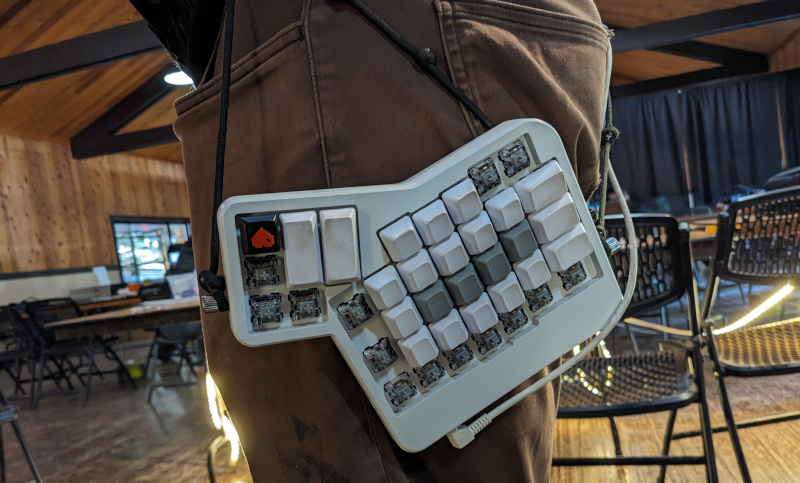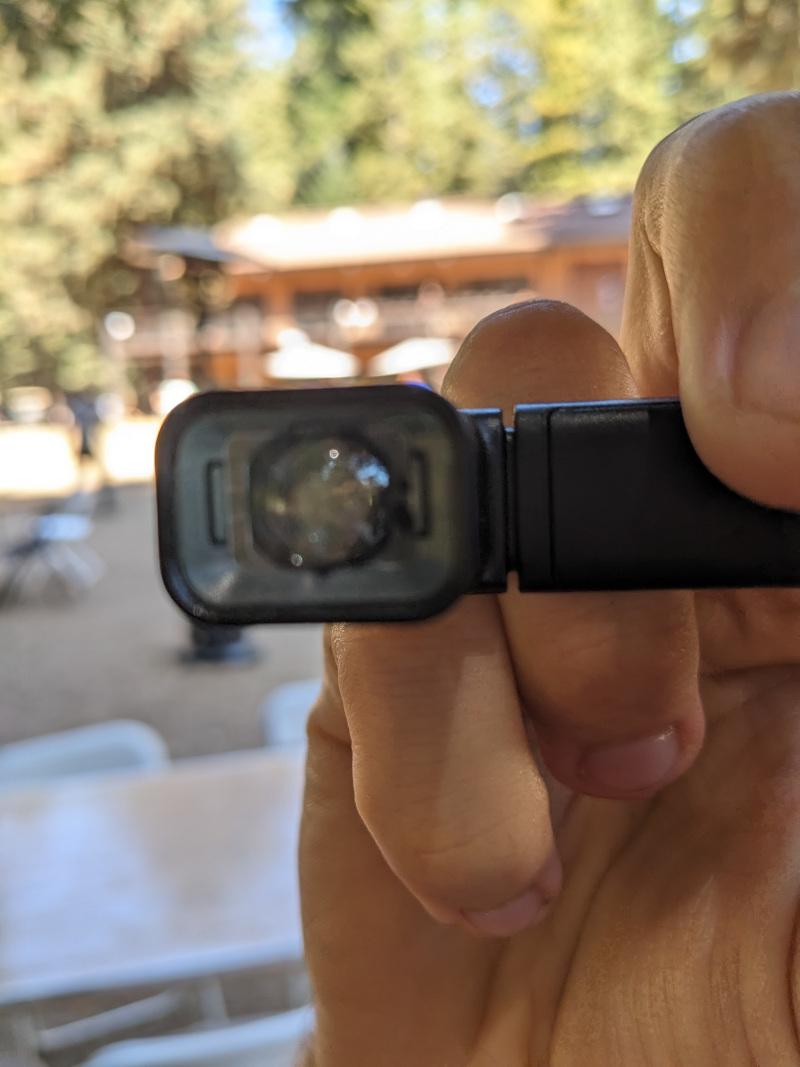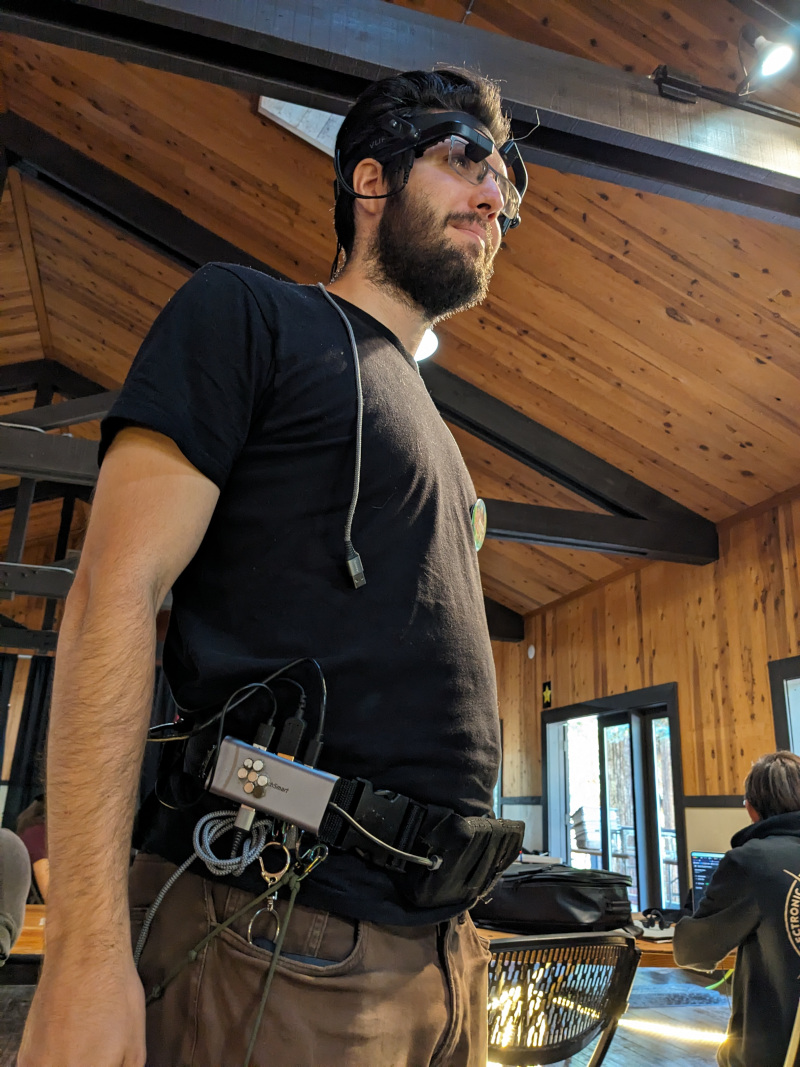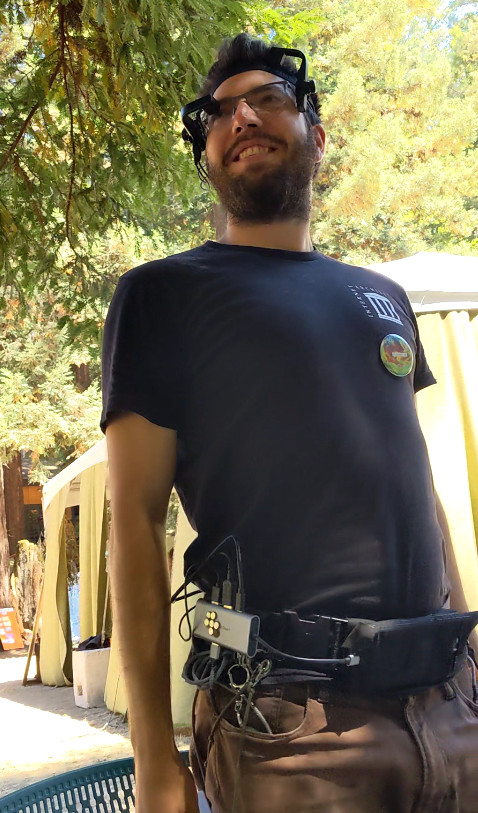The DIY FOSS cyborg
Do you feel the allure of becoming a cyborg? Are you one of those people who loves computing, but hates what computing has become? Do you wish to become one with your computing environment, without having to give into an immersively curated dystopian corporate version of computing we experience today? Throw off the shiny shackles of Apple, dismiss the metaverse garbage Mark Zuckerberg is trying to sell you. We are going for something simpler, something more powerful, something only beholden to you.

And also something a little bit clunkier. But in a good way. The way that installing your first Linux distro on that old laptop felt. Freedom, in a dorkier, clunkier, but more liberating sense.
Encompassing, but configurable. Fully embracing computing as an extension of you, but within your control.
My friends. That future is here. I have met the DIY FOSS cyborg. He lives not in an overly saturated 3d graphical environment, wears not an awkward bucket over his head. No, we are talking about a fulltime Linux and Guix and Emacs cyborg, living with an org-mode overlay over his eyes. The hacker's cyborg.
And lo, I bring you the good news: you too can become such a cyborg. The technology is here today! And it is far simpler, and far dorkier (in a delightful way). And you can have it. You too can become a DIY FOSS cyborg.
Meeting Zacchae, the Emacs and Guix dadcore cyborg
It's best to have Zacchae introduce himself and his own setup. I will do so in a moment, and I even have a video. You can skip ahead to it in the next section if you like. But if you are willing, perhaps indulge me in a story.
When I first met Zacchae, it was at DWeb Camp earlier this year. The experience had a strange religious overtone to it.
DWeb Camp is always overwhelming to me, and I forget just how overwhelming until I am there. "See you Sunday, Christine!" said Dave Thompson (Spritely's CTO), as we pulled up our rented car onto the gravel parking lot of the campgrounds. I barely got out a "What do you mean?" before I found myself consumed by the nonstop series of conversations, presentations, and lying face-down in the darkness in our cabin trying to recover social spoons in-between the above.
On the first night of DWeb Camp, people were gathered around. There was a bonfire. The redwoods loomed large.
Zacchae approached me. "I am running Emacs and Guix on my computer. I have org-mode projected over my vision and I can access it wherever I wander. Would you like to see?"
I stood there, dazed, as the fire flickered shadows about. "I am interested, but I cannot possibly mentally process this right now. Please ask me tomorrow."
Zacchae nodded politely and left me to lesser conversations of the evening. Protocols, the ethics of decentralization. Simpler, more familiar topics for my mind in such a state.
The next day passed. More socializing, nonstop. Presentations. We ran a booth where we showed off the "Spritely Arcade", playable demos of our tech while we explained what the ramifications were to interested audiences. Our booth was so popular it jammed the space and we were demonstrating and talking for two hours straight.
We packed up. I wandered, dizzy, over to the fire to socialize again, unable to speak or think about even the slightest of technical topics.
Zacchae approached again. "Hello. Would you like to look into the display now? It is very easy." He removed the overlay from his eye and offered it to me, hand outstretched.

But my brain could not process anything. I understood this was something I wanted to see, but I could not quite comprehend it.
An offer twice refused. Zacchae nodded politely and let me resume simpler conversations.
In the morning of the third day I had another presentation, jointly given with Dave. And then I was done! I was free of all the main things I was scheduled to do and say. I felt elated. Dave and I high-fived. We could enjoy the conference now.
I headed down to the center of the event to socialize with some friends. Lunch would be starting soon. I was feeling bubbly with the relief of being free of obligations.
Zacchae approached once more and said, "Hey, just curious, would now be a good time to look at the Emacs and Guix computer thing?" But by this time I was a little bit irritated. My brain went into the mode of "this is someone who I have brushed off several times, probably it's because I am avoiding them" and I politely said "I'm busy but why don't we get in contact later?"
Zacchae nodded. "Oh sure. Could you give me your email?" I rattled it off and nearly turned away.
But it was an offer twice refused. A third refusal was not possible, try as I foolishly may have.
Zacchae stared into the distance and started typing at his hips. My brain jolted to reality.
This is not how a person normally interacts with a computer! my brain said, kicking me in the metaphorical shins. This is a thing you have been waiting to experience your whole adult life!
"Oh wait, holy shit, no... you've got to tell me about this! You've got to show me!"
And Zacchae did. And it was so exciting I ran off to gather the group of friends who I knew would all be equally excited. And we gathered around as he explained to us how his system worked.
Meet Zacchae's setup
I promised you that I would let Zacchae explain his computer setup himself. Luckily, I caught it on video! Here it is!
Watch on Peertube or on YouTube
When you look at it, it's astounding how simple the whole damn thing is. These are off the shelf components! A popular ergonomic keyboard. A Linux phone. A pile of extra batteries. And what's most exciting of all: the fact that we are now entering an era of technology where heads-up displays are ordinary HDMI devices!
It's hard to not be overwhelmed with the aesthetic shape of Zacchae's design. Earlier I said it was dadcore, and I think that this is true. To me, Zacchae's computer evokes similar feelings to utilikilts, swiss army knives, Linux User Groups, hackerspace projects, a shoebox of Slackware floppies, or that desktop computer your friend always left the panel of slightly unhinged because they were always opening it up to mess with it a little bit more.
It feels like an era of computing forgotten. But when you blow off the layer of accrued dust, it also feels like an era of computing vision that has nearly been lost. And here it is, afresh!
The truth is that wearable and mobile computing has been long important to me. But over time, I have become disillusioned with it. In highschool and early college, I had a series of PDAs; Palm Pilot with a fold-out keyboard, then a Sharp Zaurus which was much less useful but way cooler for actually running Linux on it. I bought an OpenMoko and then an n900; the former was a brick that never worked, but the latter was hands-down not only the greatest smartphone I have ever used, but the only one I have enjoyed using. It felt like we were on the verge of something wonderful: computers available to people in every moment of their lives, but also the freedom of control seemed more possible than ever in those days.
But the days of the Linux User Group ended, and the first big entry into wearable computing for the mass market was the creepy Google Glass, which felt like being scanned nonconsensually under Google's surveillance ray every time someone wearing one looked at you. Apple brought out the iPhone and it took over and defined the vision of smartphones, which lost any sort of useful keyboard, and critically lost the ability to install and do anything useful with them. The FOSS world pivoted away from the Debian-based n900 to Google's Android for the mobile world, which had the veneer of FOSS but without ever seeming to meaningfully deliver real practical user freedom. And I got bitter and disillusioned with my dreams.
To see Zacchae's FOSS cyborg setup revived all my interests. I'm not interested in buying a corporation's idea of a software + hardware "experience". I don't need to "click" on a remote projected object by blinking in a particular way or tapping some awkward controllers which make the Wiimote look like a comfortable experience. By god! I just want to run Emacs over my vision! I want org-mode everywhere! I want to run a terminal! I want to program! I want to have access to all my tools!
I have mentioned the dadcore + fosscore energy of Zacchae's setup a couple of times now. Well, I am fine with the fosscore side, but I can't deal with the dadcore side; that would be too dysphoric to me personally. But as Zacchae said, the main work of putting together his design is sewing. And that hints at the ability to be aesthetically adjusted to one's purposes.
What about FOSScore techno-witchocracy? Now there's an aesthetic I can get behind.
In many ways, I am a software person, not a hardware person. But I can open up a computer, I can tinker with it, even if I don't often. For a while though, I have lamented the state of hardware, as everything has gotten more locked down, more miserable, I have felt increasingly like "I wish I could live in software only... that hardware could fade to the background. I wish using my computer felt like using my computer again." Computers have become sleek, like jewelry. I don't mind jewelry; I wear it myself. But I don't want computers to only be jewelry. I want to feel empowered when I sit behind them. I don't want something closed off from me. And so more and more, I feel like being part of computing is disincentivized. I am walled off from my computing experience.
For the first time in ages, this feeling has been changing for me. MNT's computers feel community-oriented, accessible, usable in a way I miss, even if they do still feel like they're in the "enthusiast who is willing to get their hands dirty" way. I wrote a bit about my MNT Pocket Reform; even more excitingly the MNT Reform Next looks like we are starting to achieve the direction of a computer that can be hacked on and modified by others but which increasingly looks like a direction I can recommend others pick up and use. MNT's open hardware computers feel hackable and extensible, and like they have a future behind them. And feeling like computing has a future, or even a present, is something I desperately need right now.
Zacchae's designs feel future-facing in a different way, dare I say futuristic, kind of. It's a kind of retro-futurism that felt destroyed by corporate visions that locked users out and pushed them to the side instead of inviting them in. I think both of these directions, building computers that are community-oriented versions of the kinds of computing form factors in use today, and form factors that are future-facing, are worth pursuing.
And the fact is, components are finally getting cheap enough and feasible enough that the future can be here with just a bit of vision. Since recording that video a few months back, Zacchae has told me that he's now using a different output device, the XReal Air 2, which he says have been "life changing". (Zacchae also told me he has skateboarded around San Francisco while typing on his computer using these devices also... not something I can recommend the average person do or which I ever would, but I think that means we've fully achieved the clunky-FOSS version of cyberpunk movies of the 80s and 90s.) While these devices are sold with all the never-quite-living-up-to-reality augmented reality visions that a certain subset of humanity is just wild about hitting, but for me, I'm really just excited that this is an HDMI monitor that can overlay over your vision and be carried with you everywhere. And it's plug-and-play... well, heck, all of the components Zacchae has shown off are fairly modular, pluggable components. The tech is here; the big vision is in bringing them together.
And if you're interested in learning about Zacchae's setup, then good news! He's published his setup on his website. It's all there!
And so it is. I have been sketching designs on paper and soliciting the thoughts of my wife Morgan (who is far more of a textile witch than I am). I am plotting, and I am scheming my own Guix Emacs fosscore techno-witchocracy cyborg conversion.
And I am, at last, excited about computers all over again.





